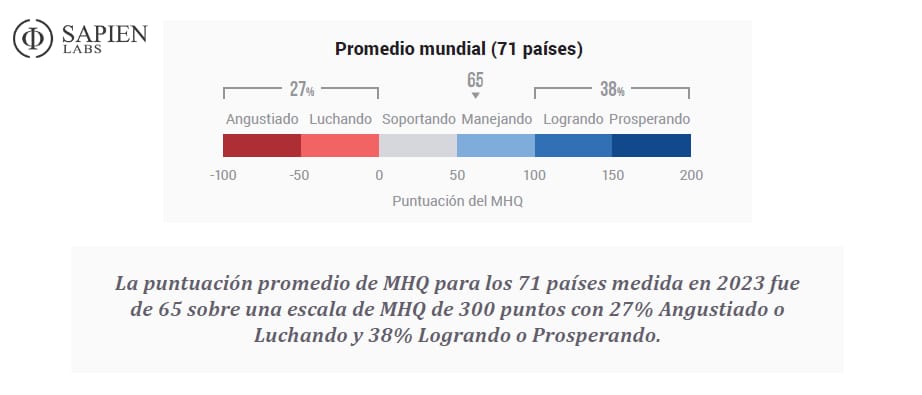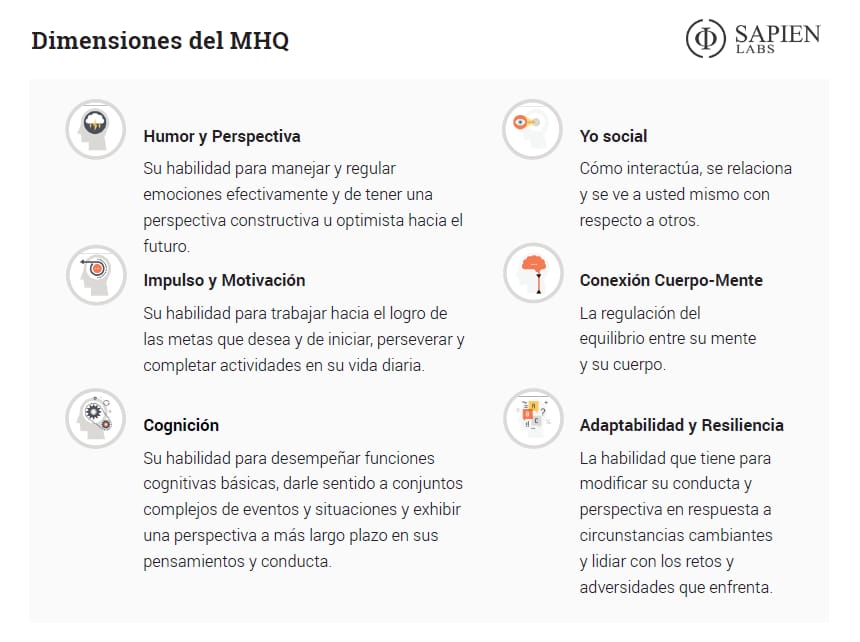Our mental health has not improved since the pandemic and this raises alarm bells. According to the latest “The State of the World” report, published in February 2024 and conducted by Sapien Labs for the World Mind Project, the decline in mental well-being that started between 2019 and 2020 has persisted on all continents, and there has been no change . recovery signal.
500,000 respondents in 13 languages in 71 countries across 9 regions, allowing a thorough read of the mental state of the population using a multi-dimensional panorama linked to the MHQ (Mental Health Quotient) assessment and ability to cope with life’s stress. And work productively.

The survey was conducted only in countries with Internet access, both developed and developing, presenting “mental well-being” not as equivalent to happiness, but as functional soundness of mind, where happiness plays a smaller part.
The consequences of the pandemic on the mental health of the world today
The COVID-19 pandemic has left consequences that are difficult to overcome. Although it was hoped that, at the end of the confinement, the mental health of the population would return to its pre-pandemic state, data obtained by Sapien Labs shows the opposite.
Social distancing due to the use of technology, confinement, consumption of ultra-processed foods, and new dynamics such as teleworking continue to cause mental health problems that have not been cured.
“Data from 64 countries shows (…) that the effects of declining global mental well-being have become the new normal,” says Tara Thiagarajan, Ph.D., founder and chief scientist of Sapien Labs. Changes resulting from the pandemic are ongoing, from increased remote work to greater use of disposable plastics, and all of these may have a contributing effect that needs to be studied and understood.
Mental health in Mexico and Latin America after the pandemic
Mental health in the region has not improved much since the pandemic, which is worrying. However, Latin American countries including Mexico top the list with the most encouraging results globally.
Regarding the average MHQ among Latin American countries, Mexico ranks tenth with a score of 76 (an increase of 2%), below countries such as the Dominican Republic, Panama, Venezuela, El Salvador, Costa Rica, Colombia and Peru. , and is located over Ecuador, Argentina and Paraguay.
Within the six dimensions of mental well-being, Mexico obtained the best scores in Adaptability and Resilience (99), Drive and Motivation (97), and the lowest scores in Social Self (75) and Humor and Perspective (76).
Overall, Latin American countries as well as African countries occupy the upper half of the measure, something that is surprising considering the difficulties that these regions go through every day, while the lower half is occupied by the main Anglosphere. Are the richest countries. As in the United Kingdom and Australia. Then what is the reason for this uniqueness?

Mental health outcomes are worst in the richest countries
A contradictory finding of the report is that the richer a country is, the worse its mental health rates. Compared to Anglo-Saxon countries, the mental well-being of the population in Latin America has been slightly positive. This is a discovery that refutes the global belief that wealth increases happiness.
The explanation that has been given, according to the trends shown by Sapien Labs experts in their previous studies, is that there are generalized behaviors that are closely related to low mental well-being.
- Social Isolation: Family relationships and emotional and friendship bonds, which tend to be stronger in Latin America, are much more fragile in these Anglo-Saxon countries, something that affects the mental and emotional health of their inhabitants in old age. (Mental State of the World Report, 2022)
“More wealth and economic growth does not necessarily lead to better mental well-being, but can lead to consumption patterns and broken social relationships that are harmful to our potential to prosper. This discourages focusing exclusively on economic indicators as measures of human progress and well-being. “Instead, the focus should be on how wealth is created and how it is used to pave the way for overall prosperity coupled with human well-being.”
This finding is not cause for celebration for Latin America, as despite slightly improving, mental health in the region remains relatively stable three years after the pandemic. However, it invites consideration of our population’s race towards quick creation of wealth.
Some thoughts on mental well-being after the pandemic
It is worrying that there is no significant change in these results since 2020. Sapien Labs experts raise the question whether these effects left by the pandemic will be permanent or whether we will normalize these changes in our daily routine – remote work, remote communication, poor diet – to such an extent that we will not be able to return to before. Existing situation. pandemic.
Experts in the study believe, “It is important that we work to understand why there is no improvement.” “As human beings we together face the risk of normalizing poor mental health which could have devastating consequences for the long-term prospects of society.”
(tagstotranslate)pandemic

